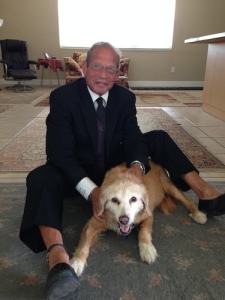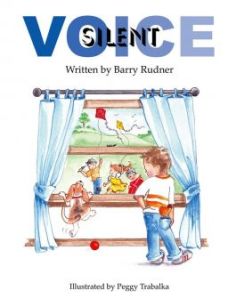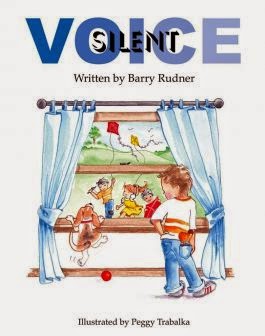 Barry Rudner has been an author/poet of self-esteem books for children for over thirty years, dealing with universal truths such as, reaching for your dreams, homelessness, undying friendships, disability awareness, always being yourself, autism awareness, hope and utter silliness. He firmly believes that we cannot educate our children unless they feel good about who they are; and ultimately, as they grow up, they will not feel good about themselves unless they educate themselves. Please feel free to visit us at our website at www.nickoftime.us.
Barry Rudner has been an author/poet of self-esteem books for children for over thirty years, dealing with universal truths such as, reaching for your dreams, homelessness, undying friendships, disability awareness, always being yourself, autism awareness, hope and utter silliness. He firmly believes that we cannot educate our children unless they feel good about who they are; and ultimately, as they grow up, they will not feel good about themselves unless they educate themselves. Please feel free to visit us at our website at www.nickoftime.us.
Thank you for joining us today, Barry Rudner. Can you please start off by telling us a bit about yourself?
I am a product of an incredible education from my parents. My formal education was a double major in biology and religious studies. I thought I wanted to grow up to become a doctor, but I realized I wanted to grow up and try to answer questions in ways that science cannot. But it is this hybrid of both degrees that gives me a certain insight into the world of children’s literature. In other words, as a scientist, I know the grass is green because the chlorophyl absorbs all the wavelengths of light and reflects the green. But as a children’s author, it is so much more poetic to think that the grass is green because it envies where the children have stepped.
When did you first get bit by the writing bug?
I was in graduate school in the late ’70s trying to earn a Masters degree in neuroanatomy in the hopes of being admitted into medical school. I was at a friend’s house, and he had a room mate who was taking a children’s literature course. On the kitchen table was Shel Silversteins, The Giving Tree. That one moment completely changed the path of my life.I knew that I would spend the rest of my life chasing after what I consider to be the most linear thought ever committed to paper for children. I have been pursuing this goal ever since.
Why did you decide to write stories for children?
I started writing stories for children because I love the way they think. If I may be so bold to quote Robert Burton, Anatomy of Melancholy, “…and such things commonly please us best which are most strange and come from farthest off.” And that in essence is our children. Somehow, in their innocence they understand things that we do not even mean. They are living, breathing allegories. Children are that very thing that “comes from farthest off”.
Do you believe it is harder to write books for a younger audience?
I believe that my life would be much harder if I did not write for children. I believe I understand my audience as well as my craft. Children’s literature is no different than taking a felled tree and stripping it of its bark and limbs and whittling it down to the size of a toothpick; and, right when you think you are done you split it in half. That is children’s literature.
What is your favorite part of writing for young people?
My favorite part about writing for children, especially thirty-two page picture books is to teach them universal truths without ever dealing with what is real. By definition, that is a fairy tale. Teaching them to reach for their dreams. Teaching them to be themselves. Teaching them to be aware of the less fortunate. The beauty of truth is that it is multi-cultural and I never have to deal with what is real: only with what is true.
 Can you tell us what your latest book is all about?
Can you tell us what your latest book is all about?
The latest book is entitled, Silent Voice, and it is a modern day allegory about autism awareness: that the only ought in autism is that we ought not ever give up trying to find the cause and cure. The majority of the world population is not even aware of the pandemic nature of this disorder. But the book is not about finger pointing or blame. It is about educating those who are simply unaware.
What inspired you to write it?
Last year in March I was speaking to a dear friend, Nicole Albert, a licensed therapist, who approached me about writing a book about the lack of awareness of those children that fall under the spectrum of autism: worldwide one in eighty-eight suffer from this disorder. It is a staggering number when you consider the statistics. I simply felt that it needed to be addressed. After three months of researching, I started the process of rewriting.
Where can readers purchase a copy?
Silent Voice can be purchased online at our website at http://www.nickoftime.us in a variety of electronic formats as well as a hardcover version of the book. Our hope is that the book version will become a part of bookshelves everywhere.
What is up next for you?
For an author, even a barely-an-author-type like myself, all that matters is to rewrite a book that is worthier than the one that proceeded it.
Do you have anything else to add?
It took almost eleven years to become published. For anyone aspiring to become an author, do not take rejection personally. Take it as a complement. It means your work is being circulated. You are looking for that one editor who is searching for that very manuscript you have written. Case in point: I once met the editor at a symposium who rejected Richard Bach’s, Jonathan Livingston Seagull, because their was no mass market appeal for it. Need I say more.
Thank you for spending time with us today, Barry Rudner. We wish you much success.









 0 Comments on April is also Autism Awareness Month as of 1/1/1900
0 Comments on April is also Autism Awareness Month as of 1/1/1900



[…] Interview on The Children’s and Teen’s Book Connection […]